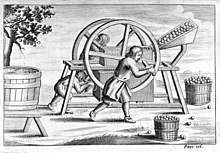Devon colic


Devon colic was a condition that affected people in the English county of Devon during parts of the 17th and 18th centuries, before it was discovered to be lead poisoning.
The first written account of the colic comes from 1655. Symptoms began with severe
However, the precise cause was not discovered until the 1760s when Dr George Baker put forward the hypothesis that poisoning from
The publication of his results met with some hostile reaction from cider manufacturers, keen to defend their product. Once Baker's conclusions became accepted and the elimination of lead from the cider presses was undertaken, the colic declined. By 1818, Baker's son reported that it was "hardly known to exist" in Devon.
Poitou colic
An illness with identical symptoms was described from Poitou in western France in a work of 1616 by François Citois.[2] It was known in English sources as Poitou colic. It was likewise demonstrated to be a form of lead poisoning in a 1757 publication by Théodore Tronchin of Geneva.[3]
References
- ^ Alick Cameron, ‘Musgrave, William (1655–1721)’, Oxford Dictionary of National Biography, Oxford University Press, Sept 2004
- ^ Franciscus Citesius, De novo et populari apud Pictones dolore colico bilioso diatriba (Poitiers, 1616) Online edition
- ^ T. Tronchin, De colica Pictonum (Geneva, 1757) Online edition
External links
- Etched on Devon's Memory - paper from Conference of Healthcare Librarians, 1996
